|
|
|
Sort Order |
|
|
|
Items / Page
|
|
|
|
|
|
|
| Srl | Item |
| 1 |
ID:
151526


|
|
|
|
|
| Summary/Abstract |
A ‘robust turn’ in UN peace operations has ushered in a new generation of missions that are epitomized by increased authorization and willingness to use force towards the protection of vulnerable civilians and the implementation of stabilization strategies. This forceful transformation has important implications for not only particular components of the peace support effort but the overall endeavour. However, the potential unintended consequences remain underexplored and require further attention. This article examines the impacts of this so-called ‘robust turn’ in UN peace operations. The first section maps trends in modern peace operations that comprise the ‘robust turn’. It proceeds to explore a range of repercussions precipitated by these trends with particular focus on unintended consequences. The article concludes by identifying the associated implications for specific missions as well as the peacekeeping endeavour as a whole. It argues that the unintended consequences of the robust turn present significant principled and practical challenges for mission architects and managers, as well as their political masters, in achieving unity of effort in UN peace operations. It further argues that this could have ramifications for the future reputation, substance and viability of UN peacekeeping.
|
|
|
|
|
|
|
|
|
|
|
|
|
|
|
|
| 2 |
ID:
161809


|
|
|
|
|
| Summary/Abstract |
In China energy-saving mandates issued by the central government can trigger a trade-off between faithful implementation and kinds of strategic responses at the local level. This paper examines the biased data revision pattern of Chinese provinces under incentives created by energy-saving mandates. The data revisions conducted by provinces in the treatment group are evaluated against those carried out by their counterparts in the control group. Empirical evidence is provided that some provinces in the treatment group conducted biased data revisions by taking advantage of benchmark revisions of historical data following the 2008 Economic Census. These provinces adjusted their base-year energy consumption figure upward in seeking to reach the 2010 energy intensity reduction targets numerically. In institutional terms, strong political incentives are formed by assigning energy-saving indicators a veto power in cadre performance assessment. In a self-reported statistical regime, checks and balances are particularly weak regarding benchmark revisions of historical data. The findings of this paper suggest that the data quality of associated official statistics at the local level is undermined by energy-saving mandates. To improve the data quality of the official statistics, new checks and balances should be installed for local statistics.
|
|
|
|
|
|
|
|
|
|
|
|
|
|
|
|
| 3 |
ID:
163657


|
|
|
|
|
| Summary/Abstract |
“Unintended consequences” is an umbrella concept. It comprises phenomena that differ in crucial respects and consequently, without refinement, it remains a rather blunt instrument for policy analysis. The contributions in this volume, however, show that disentangling unintended consequences by making clear distinctions between various types, makes the concept much more useful for policy analysis. Assessing the impact of EU foreign policies as studied in this volume, we show that “bonuses”, “windfalls”, “accidents”, and “trade-offs” – all unintended – are very different when it comes to the explanation of policy outcomes, or to allocating responsibility for them.
|
|
|
|
|
|
|
|
|
|
|
|
|
|
|
|
| 4 |
ID:
144337


|
|
|
|
|
| Summary/Abstract |
The use of surrogate or ‘proxy’ actors within the context of ‘irregular’ or guerrilla conflict within or between states constitutes a phenomenon spanning nearly the whole of recorded human military history. Yet it is a phenomenon that has also acquired urgent contemporary relevance in the light of the general evolution of conflict in Ukraine and the current Middle East. This introduction to a special issue on the theme investigates some potentially important new avenues to studying the phenomenon in the light of these trends.
|
|
|
|
|
|
|
|
|
|
|
|
|
|
|
|
| 5 |
ID:
163651


|
|
|
|
|
| Summary/Abstract |
Unintended consequences arising from EU external migration policy are a result of the multi-actor nature of this policy and of policy interactions. In addition, scholars face serious methodological challenges in establishing what the EU’s ‘intent’ is in external migration policy and, therefore, in determining which consequences are intended and which are unintended. The literature on the implementation and evaluation of EU external migration policy is in its infancy, and future work should take into account all policy outcomes – both those that were intended and those that were not.
|
|
|
|
|
|
|
|
|
|
|
|
|
|
|
|
| 6 |
ID:
158104
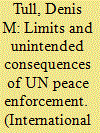

|
|
|
|
|
| Summary/Abstract |
Recent scholarship has discerned an increasing tendency of the UN Security Council to push the boundaries of UN peacekeeping beyond traditional doctrine by equipping peace operations with ever more robust and even peace enforcement mandates. The first and most frequently cited example of this turn is the so-called Force Intervention Brigade (FIB) in the DR Congo. Yet, a comprehensive account of the FIB experience is still missing. Authorized in March 2013 to launch offensive military operations against insurgent groups, the FIB may come to epitomize a sea change in the transition from robust peacekeeping to a qualitatively different kind of UN peace operation. Thus, studying the FIB can offer important insights about the advantages and challenges that may be in store for the UN, should the organization indeed turn towards peace enforcement. The articles analyses the origins, performance and consequences of the FIB in terms of conflict resolution and state-building. It also examines its organizational impact on the UN peace operation in which it was embedded (Monusco). It finds that the FIB has not proven to be the game changer. Instead, it had unintended negative consequences both on state-building and the performance of UN peacekeepers.
|
|
|
|
|
|
|
|
|
|
|
|
|
|
|
|
| 7 |
ID:
163652


|
|
|
|
|
| Summary/Abstract |
The EU’s proposal to renew the EU-ACP Agreement in spite of a number of signals pointing in the opposite direction is, inter alia, the unintended consequence of independent decisions taken in three different policy areas (trade, environment, and foreign and security affairs). The common unintended consequence that the three decisions shared would not have materialised if the European Commission had not purposefully triggered it to justify its vision of future EU-ACP relations. These findings challenge the prevailing and superficial usage of the notion of the unintended as a synonym for unanticipated and undesirable, and demonstrate that unintended consequences do not necessarily presuppose lack of anticipation, but may well be the result of calculation by policymakers.
|
|
|
|
|
|
|
|
|
|
|
|
|
|
|
|
| 8 |
ID:
182051


|
|
|
|
|
| Summary/Abstract |
During the 1980s and 1990s, U.S. policymakers adopted draconian criminal justice polices including widespread use of extremely long sentences, including life without parole. The country is now coming to face the consequences of these policies: a new class of geriatric prisoners posing little threat to public safety as they age into their seventies and beyond. Using a perspective drawn from bounded rationality, framing, and agenda-setting, we recount how policymakers adopted these policies, with key blind spots relating to obvious consequences of these harsh laws. We show how political leaders can over-respond to a perceived public policy crisis, particularly when powerful frames of race, fear, and dehumanization come to dominate the public discourse. We show how these trends are radically changing the demographics and needs of prison populations through a chronological review, mathematical simulation of the prison population, review of statistics about prison population, and personal stories illustrating these themes drawn from inside prison.
|
|
|
|
|
|
|
|
|
|
|
|
|
|
|
|
| 9 |
ID:
159442


|
|
|
|
|
| Summary/Abstract |
By analyzing the use of baton rounds as riot control weapons during the Northern Ireland “Troubles,” this article explores the British Army’s difficult transition from colonial counterinsurgency to a war in which the army faced greater public sensitivity and scrutiny than before. British forces tried to minimize the use of force against rioters by introducing new non-lethal baton rounds. But soldiers often disregarded the rules of engagement by firing the weapons excessively and at unsafe distances, which resulted in injuries and deaths that infuriated the local population. The technological innovation of baton rounds thus undermined British counterinsurgency efforts.
|
|
|
|
|
|
|
|
|
|
|
|
|
|
|
|
| 10 |
ID:
163654


|
|
|
|
|
| Summary/Abstract |
After Russia’s retreat from the European Neighbourhood Policy, the EU’s policy towards its eastern neighbours was split up. The internal unintended consequence of the EU’s choice to leave its policy unaltered was a tension between the objective of privileged relations with ENP countries and a promise to recognise the interests of Russia as an equal partner. Externally, the unintended outcome was that this fostered two opposing strategic environments: a cooperative one for the EaP and a competitive one with Russia. In terms of the management of unintended consequences, the EU has actively sought to reinforce its normative hegemony towards EaP countries, while at the same time mitigating certain negative unintended effects.
|
|
|
|
|
|
|
|
|
|
|
|
|
|
|
|
| 11 |
ID:
145270
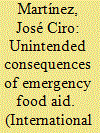

|
|
|
|
|
| Summary/Abstract |
This article dissects the role of emergency food aid during the current Syrian conflict. Drawing on Séverine Autesserre's concept of frames and Giorgio Agamben's theory of sovereignty, we argue that the neutrality frame, which undergirds the majority of humanitarian relief efforts in Syria, obfuscates the impact of emergency food aid, both on sovereign power relations and local political dynamics. While neutrality appears benign, it has had a tangible impact on the Syrian civil war. Through close scrutiny of various case-studies, the article traces how humanitarian efforts reinforce the bases of sovereign politics while contributing to a host of what Mariella Pandolfi (1998) terms ‘mobile sovereignties’. In the process, humanitarian organizations reaffirm sovereign power while also engaging in similar activities. We then analyse how and why ostensibly neutral emergency food aid has unintentionally assisted the Assad regime by facilitating its control over food, which it uses to buttress support and foster compliance. By bringing external resources into life-or-death situations characterized by scarcity, aid agencies have become implicated in the conflict's inner workings. The article concludes by examining the political and military impact of emergency food assistance during the Syrian conflict, before discussing possible implications for the humanitarian enterprise more broadly.
|
|
|
|
|
|
|
|
|
|
|
|
|
|
|
|
| 12 |
ID:
163656
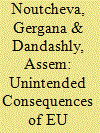

|
|
|
|
|
| Summary/Abstract |
The European Union’s (EU) impact on the political governance of the European neighbourhood is varied and sometimes opposite to the declared objectives of its democracy support policies. The democracy promotion literature has to a large extent neglected the unintended consequences of EU democracy support in Eastern Europe and the Middle East and North Africa. The EU has left multiple imprints on the political trajectories of the countries in the neighbourhood and yet the dominant explanation, highlighting the EU’s security and economic interests in the two regions,cannot fully account for the unintended consequences of its policies. The literature on the ‘pathologies’ of international organisations offers an explanation, emphasizing the failures of the EU bureaucracy to anticipate, prevent or reverse the undesired effects of its democracy support in the neighbourhood.
|
|
|
|
|
|
|
|
|
|
|
|
|
|
|
|
| 13 |
ID:
163649


|
|
|
|
|
| Summary/Abstract |
There is a gap in IR and EU scholarship concerning unintended consequences in an international context, leaving this important phenomenon understudied. To fill this gap, a conceptualisation of unintended consequences is offered, and a set of common research questions are presented, highlighting the nature (what), the causes (why) and the modes of management (how) of unintended consequences of EU external action. The Special Issue contributes to the study of the EU as an international actor by broadening the notion of the EU’s impact abroad to include the unintended consequences of EU (in)actions and by shedding new light on the conceptual paradigms that explain EU external action.
|
|
|
|
|
|
|
|
|
|
|
|
|
|
|
|
| 14 |
ID:
138596


|
|
|
|
|
| Summary/Abstract |
On 30 July 2014, the European Union published its ‘third-stage’ sanctions on Russia in response to Russian policy towards Ukraine.1 These measures, which came into effect the following day, target whole sectors of the economy rather than individuals and companies, as in the previous two stages. Specifically, they take aim at oil exploration, military assistance, sensitive advanced technology and state-owned banks.
|
|
|
|
|
|
|
|
|
|
|
|
|
|
|
|
| 15 |
ID:
158109


|
|
|
|
|
| Summary/Abstract |
Cohesion has a positive influence on many aspects of everyday life, including improved military performance. However, due to focus on the positives, many studies tend to omit potentially negative outcomes of cohesion. It is particularly important in regard to authoritarian military institutions, in which unit cohesion can have unintended consequence resulting in dehumanizing effect of the out-groups. The following research examines the process from cohesion to dehumanization and argues that there is a need to change the way how unit cohesion is achieved. The distinction is made between the controlled and autonomous cohesion. It will be argued that autonomous locus of causality is potentially more beneficial for military cohesion and performance in conflict environments.
|
|
|
|
|
|
|
|
|
|
|
|
|
|
|
|
| 16 |
ID:
163655


|
|
|
|
|
| Summary/Abstract |
The existing literature on state-building has focused mainly on post-conflict cases and ‘conventional’ examples of statehood, without taking into consideration the particularities of states that remain internally and/or externally contested. The EU’s engagement in Palestinian state-building through the deployment of EUPOL COPPS and EUBAM Rafah has generated various types of unintended consequences: anticipated and unanticipated, positive and negative, desirable and undesirable, some of which fulfill and some of which frustrate the initial intention. These have important reverberations for the EU’s conflict resolution strategies in Israel and Palestine, the most important being the strengthening of power imbalances and the enforcement of the status quo.
|
|
|
|
|
|
|
|
|
|
|
|
|
|
|
|
| 17 |
ID:
163653
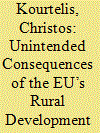

|
|
|
|
|
| Summary/Abstract |
After the Arab revolts, the EU designed a new regional rural development programme to address the various political and economic threats in the Arab Mediterranean countryside. Although the programme is based on a new cognitive framework, it has generated unintended consequences that undermine its effectiveness. These consequences were predictable. They are a product of path dependency and the inability of policymakers to draw lessons from previous EU initiatives with similar aims and to contextualise the relationship between small farmers and political elites in the Arab countryside.
|
|
|
|
|
|
|
|
|
|
|
|
|
|
|
|
| 18 |
ID:
165917


|
|
|
|
|
| Summary/Abstract |
The trend towards a more robust use of force in UN peacekeeping operations has received considerable attention from scholars pointing to the risk of unintended consequences. Since the report of the High-Level Independent Panel on Peace Operations, the primacy of politics is expected from all UN peace operations. The unintended consequences stemming from this primacy of politics has received considerably less attention, especially in the context of the UN’s political missions. Through an analysis of the UN’s engagement with the crisis in Burundi in 2015–2016, the article shows how the UN’s political role was implemented in a specific case. The case demonstrates that unintended consequences from the primacy of politics have overlaps with those related to robust peacekeeping, but also differ on important aspects.
|
|
|
|
|
|
|
|
|
|
|
|
|
|
|
|
| 19 |
ID:
163650


|
|
|
|
|
| Summary/Abstract |
Although stalled since 2016, the negotiations on a Transatlantic Trade and Investment Partnership (TTIP) have had major unintended consequences. The TTIP led to demands from third countries to upgrade their trade relationship with the EU and to unprecedented politicisation. As second-order effects of the latter, it endangered the EU-Canada trade agreement and brought about reform of EU trade governance and amendments to EU trade policy positions. These unintended consequences occurred because of inflated expectations about and insufficient awareness of the different nature of TTIP with regard to scope and partner compared to other trade negotiations. In the meantime, EU trade policy has adapted to the new politics of trade, making unintended consequences less likely.
|
|
|
|
|
|
|
|
|
|
|
|
|
|
|
|
| 20 |
ID:
189268
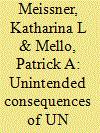

|
|
|
|
|
| Summary/Abstract |
Sanctions are widely used foreign policy tools in reaction to crises in world politics. Accordingly, literature on sanction effectiveness—their intended consequences—is abundant. Yet, fewer studies address the unintended consequences of restrictive measures. This is remarkable given that negative externalities are well documented. Our article explores this phenomenon by asking under which conditions sanctions yield negative externalities. We develop a theoretical conceptualization and explanatory framework for studying the unintended consequences of UN sanctions. Empirically, we draw on data from the rich, but scarcely used Targeted Sanctions Consortium and apply qualitative comparative analysis (QCA) to examine negative externalities of UN sanctions, complemented by illustrations from the cases Haiti and North Korea. The results document the existence of multiple pathways toward unintended consequences, highlighting the negative impact of comprehensive and long-lasting sanctions, as well as the ability of autocratic targets with economic means to persist unscathed from sanctions.
|
|
|
|
|
|
|
|
|
|
|
|
|
|
|
|
|
|
|
|
|